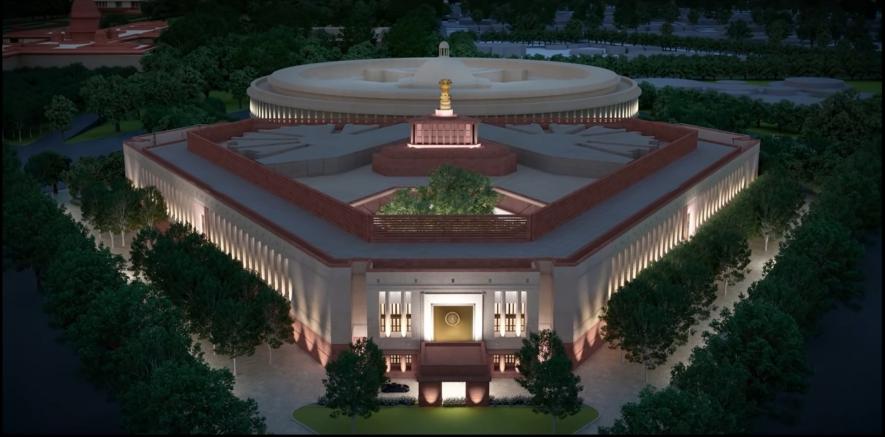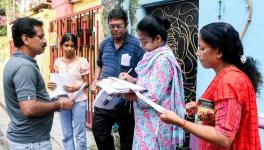Explained: What's the Law on ‘One Nation, One Election’?

Image Courtesy: Wikimedia Commons
Amidst strong opposition from Opposition parties, the treasury benches on Tuesday introduced the Constitution (One Hundred and Twenty-Ninth Amendment) Bill, 2024, which seeks to pave the way for the simultaneous elections to the House of the People (Lok Sabha) and all legislative assemblies in India.
The proposed Bill seeks to add and modify articles to the Constitution to enable simultaneous elections. It has also recognised what is colloquially known as ‘mid-term’ elections.
Indian National Congress member of Parliament (MP) Manish Tiwari attacked the Bill. He said it is an assault on the basic structure of the Constitution and against democracy. He even questioned the Parliament's legislative competency in enacting such a law. MPs from the Samajwadi Party and the All India Trinamool Congress also opposed the introduction of the Bill in the Lok Sabha.
Under Article 368(2) of the Constitution, an amendment to the Constitution is required to be passed in each House by a majority of the total membership of that House and by a majority of not less than two-thirds of the members of that House present and voting.
If the amendment seeks to make any changes to Articles 54, 55, 73, 162, 241 or 279A, it requires ratification by the legislatures of not less than one-half of the states. Similar ratification is required if the amendment seeks to make any change to Chapter IV of Part V, Chapter V of Part VI, or Chapter I of Part XI of the Constitution. The same is also required for any change to any of the Lists in the Seventh Schedule; or the representation of states in the Parliament; or the provisions of Article 368 itself.
The Articles which the Bill seeks to amend do not fall under the proviso which requires ratification by the state assemblies.
Indian National Congress member of Parliament (MP) Manish Tiwari attacked the Bill. He said it is an assault on the basic structure of the Constitution and against democracy.
Proposed introduction of new Article 82A in the Constitution
The Bill seeks to add Article 82A to the Constitution. Sub-clause 1 of Article 82A provides for the appointment date on which the provisions of the Bill would come into force.
The President will do this through a public notification issued on the date of the first sitting of the House of the People after a general election.
Sub-clause 2, which is an important one, provides that notwithstanding anything in Article 83 and Article 172, the term of all legislative assemblies constituted in any general election held after the appointed date and before the expiry of the full term of the House of the People shall come to an end on the expiry of the full term of the House of the People.
This means that some state assemblies will have their five-year terms curtailed to pave the way for simultaneous elections.
Under Article 83(2), the House of the People, unless sooner dissolved, has a tenure of five years from the date appointed for its first meeting and no longer and the expiration of the said period of five years shall operate as a dissolution of the House.
Likewise, under Article 172, the duration of state legislative assemblies is five years from the date appointed for its first meeting and no longer and the expiration of the said period of five years shall operate as a dissolution of the assembly.
Interestingly, neither Article 83 nor 172 refer to mid-term elections.
Sub-clause 3 of the draft Article 82A provides that notwithstanding anything in the Constitution or any law for the time being in force, and before the expiry of the full term of the House of the People, the Election Commission of India shall conduct general elections to the House of the People and all legislative assemblies simultaneously and the provisions of Part XV, which deal with the conduct of elections, shall apply to these elections mutatis mutandis with such modifications as may become necessary and which the Election Commission of India may, by order, specify.
The Bill seeks to add Article 82A to the Constitution. Sub-clause 1 of Article 82A provides for the appointment date on which the provisions of the Bill would come into force.
Sub-clause 4 of the draft Article 82A defines simultaneous elections as “general elections held for constituting the House of the People and all the legislative assemblies together”.
Sub-clause 5 of the draft Article 82A confers power upon the Election Commission of India to make recommendations to the President to hold the election to a particular legislative assembly at a later date if the same, in the opinion of the Election Commission of India, cannot be conducted along with the general election to the House of the People.
Sub-clause 6 of the draft Article 82A provides that when the election to a state assembly is deferred then, notwithstanding anything in Article 172, the full term of the legislative assembly shall end on the same date as the end of the full term of the House of the People constituted in the general election. It means that the life of the state assembly will be co-terminus with the life of the House of People.
Sub-clause 7 of the draft Article 82A provides that the Election Commission of India shall at the time of notifying the election to a legislative assembly under this Article declare the date on which the full term of the legislative assembly shall come to an end.
Proposed addition in Article 83 of the Constitution
As noted above, Article 83 deals with the lifespan of the Lok Sabha, which at present is five years unless sooner dissolved. At present, Article 83 has two sub-clauses. The proposed Bill seeks to add sub-clauses (3), (4), (5), (6) and (7).
The proposed sub-clause (3) states that the five years from the date of the first meeting of the House of the People shall be referred to as the full term of the House of the People.
The proposed sub-clause (4) states that where the House of the People is dissolved sooner than the expiry of its full term, the period between its date of dissolution and five years from the date of the first meeting shall be referred to as its unexpired term.
Then comes a very significant proposed sub-clause (5) which provides that notwithstanding anything in clause (2), where the House of the People is dissolved sooner than the expiry of its full term, the new House of the People constituted pursuant to elections occasioned by such dissolution, unless sooner dissolved, shall continue for such period as is equal to the unexpired term of the immediately preceding the House of the People and expiration of this period shall operate as a dissolution of the House.
Sub-clause 4 of the draft Article 82A defines simultaneous elections as “general elections held for constituting the House of the People and all the legislative assemblies together”.
It means that if a House of People is constituted through mid-term elections, it will not have a tenure of a fresh five years under sub-clause 2, but will last only for the remaining years which will be counted as five years from the date of the first meeting of the House of the People as referred to as the full term of the House of the People in proposed sub-clause (3).
The proposed sub-clause (6) states that the House of the People constituted under clause (5) shall not be a continuation of the previous House of the People and all the consequences of dissolution shall apply to the House of the People referred to in clause (4).
Importantly, the proposed sub-clause (7) states that the election for constituting the House of the People for its unexpired term shall be referred to as a mid-term election, and the election held after the expiry of the full term shall be referred to as the general election.
A similar amendment has been proposed to Article 172, which deals with the lifespan of the state legislative assemblies.
Report of High Powered Committee headed by former President Ram Nath Kovind
The Union government on September 2, 2023, had formed a high-powered Committee headed by former President Ram Nath Kovind to examine the issue of simultaneous elections and make recommendations for holding simultaneous elections in the country.
The then Leader of Opposition Adhir Ranjan Chowdhury, who was made part of the High Powered Committee, had withdrawn himself from the committee in protest against any such move of holding elections together.
The High Powered Committee submitted its report to the President of India on March 14, 2024. The High-Level Committee, in its report, favoured the simultaneous elections to the Lok Sabha and all legislative assemblies. It recommended that in the first stage elections to the House of the People and the legislative assemblies should be held simultaneously.
The High-Level Committee, in its report, favoured the simultaneous elections to the Lok Sabha and all legislative assemblies.
The general elections to the House of the People and all state legislative assemblies were held simultaneously in the years 1951–52, 1957, 1962 and 1967. However, due to the premature dissolution of some legislative assemblies in 1968 and 1969, the cycle of holding polls simultaneously with the House of the People was disrupted.
The Union government has been justifying the ‘One Nation, One Election’ programme for various reasons. It claims elections have become expensive and time-consuming. It also claims that the imposition of a Model Code of Conduct in several parts of the country which are poll-bound put on hold entire development programmes, cause disruption of normal public life, impact the functioning of services and also curtail the involvement of manpower from their core activities for deployment for prolonged periods for election duties.
Get the latest reports & analysis with people's perspective on Protests, movements & deep analytical videos, discussions of the current affairs in your Telegram app. Subscribe to NewsClick's Telegram channel & get Real-Time updates on stories, as they get published on our website.
























